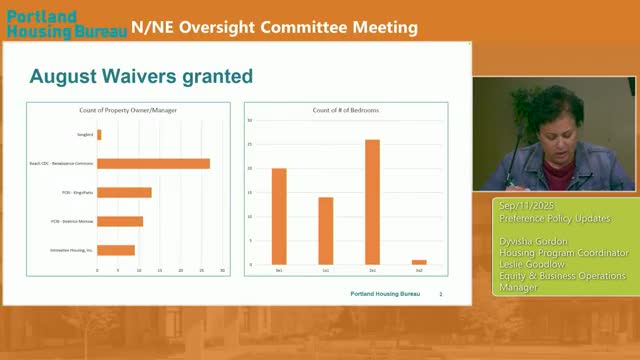Committee Considers Waiver Policy for Studio Apartments Amid Vacancy Concerns
September 12, 2025 | Portland, Multnomah County, Oregon
This article was created by AI summarizing key points discussed. AI makes mistakes, so for full details and context, please refer to the video of the full meeting. Please report any errors so we can fix them. Report an error »

The Portland Housing Bureau N/NE Oversight Committee convened on September 11, 2025, to address pressing issues surrounding housing vacancies and the effectiveness of the current preference policy. The meeting focused on the temporary waiver granted for vacant units as of August 1, allowing development partners to fill these units outside the preference policy.
The discussion began with an overview of the waiver process, which was designed to expedite the leasing of vacant units. Several agencies, including Songbird, Renaissance, and PCRI, submitted requests for waivers, particularly for studio apartments. The committee reviewed data indicating a mismatch between the demand for larger units and the availability of studios, which are often not preferred by potential tenants.
A significant point of discussion was whether to release some studios from the preference policy, as many individuals on the waiting list are seeking one-bedroom units or larger. Committee members expressed concerns about the implications of such a decision, weighing the potential benefits of filling vacant units against the risk of losing affordable housing options for those in need.
Members raised questions about the relationship between the preference policy and Section 8 housing vouchers. It was clarified that units with project-based Section 8 are not subject to the preference policy, allowing for different leasing processes. However, the limited availability of vouchers means that many individuals at 60% Area Median Income (AMI) do not qualify for assistance.
The committee also discussed the financial implications for developers, noting that many buildings are struggling with high vacancy rates. Some members suggested that releasing studios could help stabilize occupancy rates and support developers transitioning from construction loans to permanent financing. However, there were concerns about the long-term impact on the preference policy and the potential for increased demand for larger units if studios were released.
As the meeting progressed, members shared their thoughts on the need for more data to inform decisions about studio units. Some advocated for a temporary release of studios, while others cautioned against compromising the preference policy's intent. The committee acknowledged the complexity of the situation, with varying needs across different developments.
In conclusion, the committee agreed to continue exploring the issue of studio units and their role within the preference policy. The discussions highlighted the ongoing challenges in balancing the needs of developers, tenants, and the overarching goals of affordable housing in Portland. Further analysis and data collection will be essential as the committee considers potential adjustments to the policy in future meetings.
The discussion began with an overview of the waiver process, which was designed to expedite the leasing of vacant units. Several agencies, including Songbird, Renaissance, and PCRI, submitted requests for waivers, particularly for studio apartments. The committee reviewed data indicating a mismatch between the demand for larger units and the availability of studios, which are often not preferred by potential tenants.
A significant point of discussion was whether to release some studios from the preference policy, as many individuals on the waiting list are seeking one-bedroom units or larger. Committee members expressed concerns about the implications of such a decision, weighing the potential benefits of filling vacant units against the risk of losing affordable housing options for those in need.
Members raised questions about the relationship between the preference policy and Section 8 housing vouchers. It was clarified that units with project-based Section 8 are not subject to the preference policy, allowing for different leasing processes. However, the limited availability of vouchers means that many individuals at 60% Area Median Income (AMI) do not qualify for assistance.
The committee also discussed the financial implications for developers, noting that many buildings are struggling with high vacancy rates. Some members suggested that releasing studios could help stabilize occupancy rates and support developers transitioning from construction loans to permanent financing. However, there were concerns about the long-term impact on the preference policy and the potential for increased demand for larger units if studios were released.
As the meeting progressed, members shared their thoughts on the need for more data to inform decisions about studio units. Some advocated for a temporary release of studios, while others cautioned against compromising the preference policy's intent. The committee acknowledged the complexity of the situation, with varying needs across different developments.
In conclusion, the committee agreed to continue exploring the issue of studio units and their role within the preference policy. The discussions highlighted the ongoing challenges in balancing the needs of developers, tenants, and the overarching goals of affordable housing in Portland. Further analysis and data collection will be essential as the committee considers potential adjustments to the policy in future meetings.
View full meeting
This article is based on a recent meeting—watch the full video and explore the complete transcript for deeper insights into the discussion.
View full meeting
